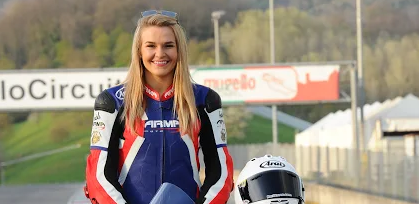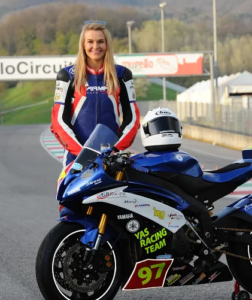
Originally from Lithuania and living in UK, Ieva Baublyte is extremely passionate about motorcycle racing and has made very rapid progress in her short racing career. She quickly escalated from being a rookie to racing against Pro riders in just 2 years. With determination and hard work, this 21-year-old has developed professional motorcycle racing skills and has accumulated wisdom far beyond her young age. As a female racer, Ieva wants to be an inspiration to other females out there and others who want to follow their dreams as well. Read on to learn from Ieva’s determination, positive attitude, and relentless work ethic have accelerated her racing career in a big way.
 Mike: Hi Ieva! So just to start off, you have a great biography. You’re doing a lot of cool things in motorcycle racing. Can you start off with how you even got to this point? Tell us a little bit about yourself.
Mike: Hi Ieva! So just to start off, you have a great biography. You’re doing a lot of cool things in motorcycle racing. Can you start off with how you even got to this point? Tell us a little bit about yourself.
Ieva: HI Mike! I am originally from Lithuania and I moved to the UK with my family for them to find better jobs and just to have better lives. And I’ve always wanted to have a bike, but because of the whole move, it was never possible, and it was almost like a dream for me to ever have one. But then as I turned 17-years-old, I was actually old enough to have a small bike and be able to ride it on the road.
So, I got myself a license, got myself and a bike. And it was only a small one to play about in the streets with, but I fell in love with it from the first moment I got it and I was riding every single day to school, to work. Everywhere I could, just keep riding and riding because it was the most amazing thing to me.
Then I rode for a whole year and then met so many different friends who were all riding on the road, but then someone introduced me to Track Days. And I said okay, so I can go to the track and I can ride even a bigger bike without having a full license, so let’s go for it. And then I did that, and then, I think, that’s when the whole track of Track Days came into my life.
So, after my first one, I just kept booking Track Days, keep riding, and then it seemed that I was actually really good at it and I was learning so fast. So, someone told me to start racing. And then I started to look into it, see if it’s possible, and I thought no way, that’s not possible. It’s too expensive. I won’t be able to afford it. So, I saw a start — I said do you have an idea? But then I met someone who was a racer and then they showed me the way to start. And then I just sort of got everyone’s ideas, everyone’s advice how to start racing.
And I got myself a bike, but bear in mind, I had no clue how I would react to race myself. I wasn’t sure whether I would be scared or if I would crash, but all of it was tests my very first round. But it seemed like I actually jumped the podium on my first round and I beat all the guys I was racing with, and I was the only girl in the class, so that was a massive confidence boost. And since then I just kept racing. I finished the whole season and I got good results. I even had a win in the rain, as well, so that was really, really a big achievement for me. And bear in mind, it was my first season racing, so you know, everyone was in tears watching me.
Mike: How old were you, at that point? You got a bike at 17 and how old were you when you started informally racing?
Ieva: So, I started racing when I was 19.
Mike: Nineteen, wow.
Ieva: It was two years after I started riding. And then I had a really good first season and I progressed so quickly, that someone found me, and they invited me to race in the British Street Race, which is a top race here in the UK. So, I jumped at the time because it was an amazing opportunity. But I was one of the very few people who actually make that sort of jump from a rookie, at best, to race in a British championship. So, you know, that was a big achievement for me.
But however, I parted ways with my first team because I didn’t do enough research on the team. And then after the second round, a different team took me on and they helped me, but at that point, I did not have the financial support behind me to continue as effectively as I wanted to.
Mike: Right.
Ieva: So, the whole season was very up and down. I did get good results, but I also had a lot of mechanical problems with my bike because I didn’t have enough mechanical support behind me. So, it was just a big challenge for the whole year and I just tried to learn as much as I can and get as many results as I can. So, I was not racing 100 percent every single race because if I was to crash, I would not be able to complete the reason. But it always in my head and it was, you know, drawing me back and I thought let’s just get this season over and done with and then I’ll look forward to next year.
And then obviously, someone looked past the bike problems and they invited me to race in Italy. And, of course, Italy is one of the biggest and most passionate countries when it comes to motorsport. So again, I jumped at the chance and that’s where I’m racing right now.
Mike: Right.
Ieva: So, four years after riding, I’m now racing against some of the fastest riders in Italy.
Mike: So, the Italian Championship National Trophy Supersport 600 class, if I have that right.
Ieva: Yes.
Mike: Yeah, that’s cool.
Ieva: Yes. However, I’m not completing a full championship because my team actually can’t do that due to work commitments. So, they have to miss a few rounds of that championship, and in order to make up for that, we just do a few more in different championships. But we knew from the very start, I will not be aiming to win the championship just because of the competitiveness of the championship itself. So, we knew, you know, to get me up to speed, teaching the surface because obviously every single circuit to me is completely new. And next year, we’ll aim to get a good result in the actual championship and complete a full season of it.
Mike: That’s great. That’s great and they are great accomplishments. So just moving on, you have a relatively short career, but you’re moving up quickly.
Ieva: Yeah.
Mike: So what kind of a mindset did you use to go from having some success to I want to step out and do bigger things? Can you describe your mindset? Because that’s important in accomplishing things, no matter what you’re doing.
Ieva: It is. I mean, the mindset that you have to have is very, very positive. If you’re doing something that you really enjoy, then you are most likely to succeed at it because obviously, you’re doing it because you love it.
I see some riders, they get sometimes bored of it or it becomes too stressful and then they can no longer take it and that’s when they sort of turn around and say that’s not enough. I don’t want to do it anymore.
Mike: Okay.
Ieva: But I’ve had so many obstacles that I had to overcome and so many problems that I had to deal with throughout the whole last years of racing, but at the end of all of it, I would always ask myself, is it worth the hard work? And when you’re standing on the grid for that first race, you just say to yourself hell, yeah, it’s worth it.
Mike: Yes. That’s cool.
Ieva: Yeah. You just have to stay positive, and if you enjoy it, then just keep working hard at it.
Mike: I imagine it’s very stressful because every minute counts in the race and I imagine there’s a lot of, like you said, ups and downs in between everything.
Can you give us like a particular setback or challenge when you said oh, man, I don’t know about this anymore or maybe you never said that? But give me an example of going through some hard times and saying I’m going to come out the other end.
Ieva: Yeah. Well, I think last season when I parted ways with the first team, it made me really hard person because I was not put in a good situation. By then, I asked okay, if that’s so organized, situations that happen at this point, is it really worth it? But luckily, because they’re actually really kind people, they told me get back on the bike and get back to your next race weekend, and then that’s when I thought okay, there’s kind people and decided let’s just keep going in it, sticking at it, and just keep working hard.
Mike: Yeah.
Ieva: But that was definitely one of the worst moments throughout my career because it made me worried whether, you know, I’ll ever be able to make it if these sort of things happen.
Mike: Yeah. I mean, change is uncomfortable. A lot of people, especially going forward in a career, and this is your career, it keeps us busy and sometimes you got to get through discomfort in order to get to a better position.
Ieva: Yeah.
Mike: Some people don’t like being uncomfortable and it’ll stop them.
Ieva: No. And you have to also bear in mind that people will judge as well. So, if they see you start to race with a team, they will start asking you questions why, and then you start thinking, start wondering what other people think as well. What they think of you and what you have to say. It’s like you have to be careful of what you say to people and the reason for it happened. If someone’s upset in the end, you want to have a good racing profile.
Mike: Yeah.
Ieva: So yeah, it was definitely a challenge because I thought people would think bad things about me, but in the end, it all came out to be very positive because people saw how quickly I got back into a different team and it was a good problem. It was a problem that had a good outcome.
Mike: Yeah, that’s cool. I guess if you show a positive attitude and talent and keep moving forward, people will see that, in most cases.
Ieva: Yeah, exactly.
Mike: That’s really mature stuff for your age. How old are you right now?
Ieva: I’m 21 now.
Mike: Twenty-one. You got a lot of wisdom.
Ieva: Yeah.
Mike: That’s good. All right. So, moving forward from that, I usually always ask people from your perspective, what are success characteristics you think will help students and people entering motorsports and entering things like what you did, but in different areas? What do you think the success characteristics are for people to achieve their career goals?
Ieva: You mean, to push with goals or to…
Mike: To keep moving forward towards your goals. What kind of characteristics do you think people need to have in order to get what they want or to achieve their goals?
Ieva: Basically, I think you have to have a very, very good friendly personality. Looking at what I’ve achieved, the reason why I achieved it is because I always had a positive attitude. I was always willing to speak to everyone and anyone. I was never rude to anyone and I think that’s very, very important because like in any other sport, it’s all about who you know. That normally helps you achieve success because, you know, once you have good contacts, get their recommendations, people start talking about you. And, you know, nobody’s going to talk about someone who’s been rude or not a very nice person, they will be talking about someone who’s been friendly and has a nice attitude towards the race.
So, I think being a friendly character is very important in order to make friends and build relationships with different teams because nobody wants a rude or arrogant rider.
Mike: Yeah.
Ieva: Also, if you’re willing to put the work in it and socialize as a rider yourself, it shows people that you’re trying to achieve your goals instead of getting someone to do it for you. So, in many cases, you will find that their parents are doing everything for them and they can’t be asked to do it themselves.
Mike: Right.
Ieva: I’ve always tried to do everything on my own and even helps others from what I’ve known because people have given me advice and I would always share that advice with someone else because I’ve received the help and I think other people deserve to receive it too.
Mike: No, that’s great advice. It’s true. They say what comes around, goes around, I’m sure in your network.
Ieva: Exactly.
Mike: I do make an effort on Motorsports Career Advisor to involve a lot of females and women in racing and motorsport, in general, because I’m a big fan, frankly. I know a lot of women that are smarter than me and better than me at many things, so I’m a huge fan.
Can you talk about the younger generation, how to follow their dreams, especially for females, you know, in areas that are typically male dominated? I mean, what are your thoughts on that?
Ieva: I mean, it’s getting easier, I think, to encourage girls now because there are more girls who are competing with guys. Whereas before, not as many was willing to take that risk, you know, because they were worried about getting judged. But I feel like the more women are getting into the sport, they are gaining respect. People always ask me how do I feel about competing against men? Do they bully you? How do they react to you? And yes, of course, you get some people who have their own opinions, but the percentage of how many people actually gave me motivation and pushed me towards success is a lot higher than the negative comments that I’ve heard.
So, I mean, if you do want to follow your dreams and you are worried about what people will think or how they will react to competing against men, I think they will just have to try it and see if they enjoy it. But don’t ever worry about what other people will think because at the end of the day, it’s important for them to do what they enjoy. And you never know, they might have an incredible talent that they are not aware of until they actually try it.
Mike: That’s great. So, we always work with and advise motorsport students, and you already probably said it, but do you have any suggestions or advice — I think you just gave it already — but what else could you add to help them achieve their goals and what they’re heading towards?
Ieva: The best advice I could give them is while, like I said, socializing, speaking to people, being friendly, asking for advice. But you must also be able to learn, so you can’t just take advice from someone and listen to it and feel like it’s the best advice you have been given.
Mike: Yeah.
Ieva: You have to take in everyone’s advice and then use your common sense to see which advice will work for you and which advice won’t work for you. Looking at my situation, because I tried to learn as much as I can, as quickly as I can, I think mostly, just making every single friend, every person, and if I listened to everyone, you would find that they are completely different answers, but there’s only one thing that will work for me and another thing will work for them. So, it’s very important to be able to judge the advice that will suit you and advice that won’t.
Mike: Yeah.
Ieva: Another thing that I could suggest is doing research, just convoluting research, and look into the sport that you want to do.
Mike: Sure.
Ieva: See how others succeed and the steps they had to take. You know, you have to be constantly working on it, thinking about it. If someone speaks to you, you should have ideas running and how you can, you know, fix this or possibly work with them. You know, you just constantly have to be thinking about it. I was up every single day thinking okay, what will I do today in order to help me achieve something that will help me towards my racing? And I’ve never ever thought about it, it’s constantly in the back of my head. Yeah, just have to keep doing your research and keep thinking about it and how you can improve because sometimes an idea might click in your head, and you know, there is a door that’ll probably open the next amazing road to you.
Mike: You’re right. That’s very profound. I imagine having role models and seeing how somebody else did it and how that can influence you, what do you want to be.
You know, speaking of that, can you talk a minute about the training and preparations for your races? I imagine there’s a lot of things that I don’t know. What are some of the things that you go through?
Ieva: Yeah, of course. Basically, I’m not a professional racer. I still work full time in order to pay for own racing, to pay for my travel, my food and everything. So, my daily routine is extremely, extremely busy because at the same time I have to train, so I would end up waking up at 5 o’clock in the morning and going to work a nine-hour shift sitting by the desk, you know. And you’re not doing a lot of exercise in that nine hours, so you have to make up for it at the end of the day. And bear in mind, your mind is already drained from the whole day of thinking, so you have to push yourself to go to the gym, or you know, go outside and cycle at the end of that day, that evening, and you only get two hours to do it.
Mike: Okay.
Ieva: So basically, I’ll just work and then I go straight to the gym, two hours in the gym. And, for me, it’s straight back to bed and it’s like the whole routine for the next five days of the week.
So, I try to train a lot of cardio and working the muscles that I use for when I’m racing. And then I also have friends who have been giving me programs and give me nutrition plans and help me and give me advice on how I can improve my fitness. So, it’s been really helpful for them to actually give me advice and help me, in that respect. But it’s very hard and it can really drain your energy and make you weak, but at the end of the day, it will become worth it when you’re actually in the race and you can feel that you’ve worked hard and you’re feeling fit. Because if you’re not feeling fit, then that’s when you start losing focus, and that’s when you start making mistakes in the race, what you’re doing, that sort of thing. You don’t want to be losing focus.
Mike: Yeah. Totally, I imagine you have to different types, so there’s lots of different strength training because you’re wrestling that bike, all these different G-forces and forces on you.
Ieva: Yeah.
Mike: I can imagine that. I’m big on the gym also, so I love it too.
Ieva: Okay.
Mike: You got to pay first and get the results later, but yeah, I got you.
Ieva: Yeah.
Mike: And I did notice that you said your mom and your sister — I saw a picture of this just earlier, just recently — can you tell me a little bit about the family involvement? That’s got to a big thing.
Ieva: Yeah, of course. So, my mom and my sister, they come to every single race with me and my mom is actually very young herself, and she almost looks like our sister as well. So, she always gets many compliments, and everyone tells her that she’s like a third sister to us.
Mike: That’s cool.
Ieva: So, we always go as a trio and we’re actually remembered as the three blonde girls, but we’re constantly together and we all look alike. So that helps us be very remembered in the PITS when people see us. Yeah, that has been quite good, and we enjoy it. We enjoy each other’s company. We get each other. And it’s like we’re best friends at the same time except you don’t have enough to spend with other friends. Having each other really helps us stay positive with everything.
Mike: That’s good.
Ieva: But yeah, the fact that all three of us hang out all the time, it even helps us get picked up in a crowd. We just stand out, and you know, it’s really, really nice sometimes.
Mike: That’s good. No, that’s cool. Very good. Do you have any last piece of advice for students are people entering motorsport in order for them to achieve something they might not think they can do?
Ieva: The main advice I can give is just to work as hard as you possibly can because with hard work, anything is possible; anything, you know, in the world. You just have to really want it, and when you do want it, that’s when you think about it and that’s when the positive outcome is achieved. But yeah, you just have to work hard and train hard. And it’s hard. The road is never easy to success, but when you are there, and you achieve those results, then all the hard work is definitely worth it. You will be proud of yourself that you’ve not given up and you’ve put everything you can to achieve it.
Mike: Well, that’s great. I’ll stop on that. I want to thank you for your time. It’s been great!
Ieva: No worries. Thank you so much!



